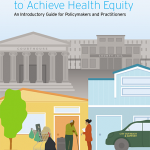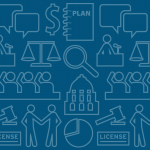COVID-19 is disproportionately harming communities of color, and as pandemic response policies are put in place, inequitable enforcement of those policies cleaves a wider gap in health disparities. Equitable Enforcement of Pandemic-Related Public Health Laws was written to highlight enforcement mechanisms and their repercussions. In their article in the American Journal of Public Health, Maya Hazarika Watts, Katie Hannon Michel, and Jessica Breslin of ChangeLab Solutions, along with Elizabeth Tobin-Tyler of Alpert Medical School and the Brown University School of Public Health, provide examples of COVID-era enforcement, showing how decisionmakers can apply equitable enforcement principles to public health law and policy both during the pandemic and after the crisis recedes.
"The enforcement of pandemic response policies between March and August, 2020, disproportionately affected Black people, with arrests being the most common enforcement action."
Equitable enforcement is a process of ensuring compliance with law and policy that considers and minimizes harms to people affected by health inequities. According to the article, “The enforcement of pandemic response policies between March and August, 2020, disproportionately affected Black people, with arrests being the most common enforcement action." Further, "using police to enforce public health laws ― during the pandemic and beyond ― is especially problematic from a health justice perspective in communities of color, given police violence against marginalized groups." In a landscape of increasing racial disparities, creating alternative enforcement strategies is critical.
“Working with community members, rather than on the community, to enforce public health laws, such as stay-at-home orders, is likely to promote better compliance.”
The authors advocate for methods rooted in racial and health justice, such as graduated penalty schemes and sliding-scale fines based on ability to pay; they also stress the importance of linking enforcement to public health education. Not only do these alternative principles promote equity, they are more effective. “Working with community members, rather than on the community, to enforce public health laws, such as stay-at-home orders, is likely to promote better compliance.”
Equitable enforcement can promote racial and health justice, increase community resilience, and improve outcomes during public health emergencies and beyond. If you’re looking to incorporate equitable enforcement into your policy landscape, check out ChangeLab Solutions' Equitable Enforcement to Achieve Health Equity, a guide that discusses best practices in design and development of enforcement provisions to promote community health.
2/10/2021

